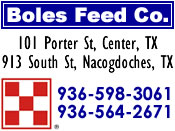September 1, 2016 - As gun deer hunting season begins, U.S. Forest Service officials are reminding hunters of guidelines designed to make their hunting trips to national forests safe and enjoyable, while sustaining the health of the forests.
Earlier this year, heavy rains and flooding damaged many roads in the forests and grasslands. While most roads have been repaired, some remain impassable and are closed. Check with the Ranger’s Office to make sure your favorite hunter camp is open.
“Hunting season is one of the busiest times in the forest, but safety is always a primary concern,” said Acting Forest Supervisor Kimpton Cooper. “Visitors should check their surroundings and be aware of the possibility for falling limbs or trees. Remember, being in the woods is great, but you are responsible for your own safety.”
Here are some other precautions:
- Much of the National Forests and Grasslands in Texas are remote, and medical assistance may not be readily available. Cellular phones do not work in many areas of the National Forests and Grasslands in Texas. Visitors should take adequate food, water, first aid supplies and other equipment appropriate for the conditions and expected weather.
- Off-Highway Vehicle (OHV) use on the National Forests and Grasslands in Texas is limited to designated routes, and the only such designation is the multiple-use trail on the Sam Houston National Forest. Cross-country and off-road use of motorized vehicles of any type is prohibited.
- All hunters and those accompanying them must wear daylight fluorescent orange at any time when hunting, except when hunting at night or when hunting turkey or migratory birds. A minimum of 400 square inches of fluorescent orange must be visible (144 square inches on both the chest and back, and a daylight fluorescent orange cap or hat.)
- All those camping or hunting in the Angelina, Davy Crockett, Sabine or Sam Houston National Forest or the Caddo National Grasslands must camp in designated campsites or developed recreation areas through Feb. 1.
- The danger of wildfires is always high. Make sure all camp fires are in an area at least three feet in diameter cleared of all flammable material, and that they are properly extinguished.
- Hunters using the wildlife management areas (WMAs) must have the $48 annual hunting permit to hunt deer, turkey, small game, waterfowl and feral hogs. Wildlife management areas in the National Forests and Grasslands in Texas include the Alabama Creek WMA in the Davy Crockett National Forest, Bannister WMA in the Angelina National Forest, Caddo WMA in the Caddo National Grassland and the Moore Plantation WMA in the Sabine National Forest. The entire Sam Houston National Forest is a wildlife management area.
- According to the Texas Parks and Wildlife Official Hunting Guide and the Public Hunting Lands Booklet, regulations vary in different locations.
- Portable deer stands in national forests and grasslands are limited to 72 hours in one location. To prevent damage to trees, the stands must not be nailed to trees. When hunters fail to remove their deer stands, it causes damage to forest land and creates an expensive, time-consuming cleanup.
- Vehicles should not be parked near gates or in areas that would impede traffic and block roads.
Hunters may also visit the National Forests and Grasslands in Texas website at www.fs.fed.usda.gov/texas and click on the Hunter Camp Maps – 2016 link for more information.









